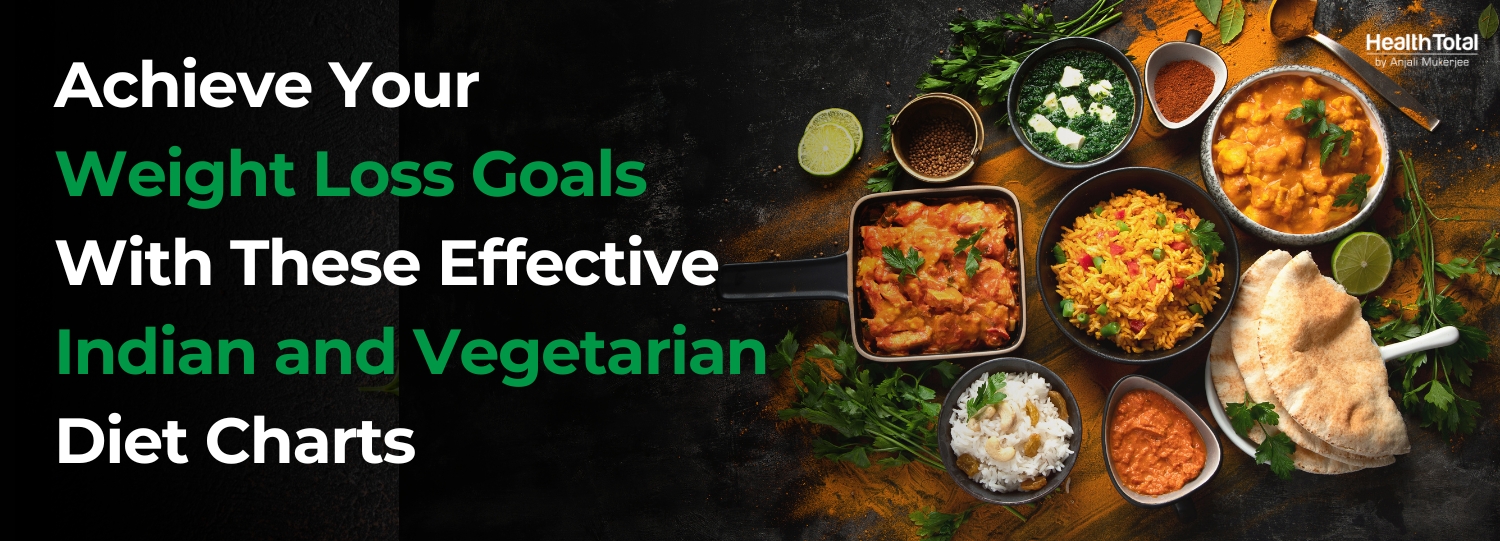
Achieve Your Weight Loss Goals with These Effective Indian and Vegetarian Diet Charts
Weight loss is a common goal for many individuals seeking to improve their health and well-being. Achieving and maintaining a healthy weight involves creating a balance between calorie intake and expenditure. Diet plays an important role in this process. A well-structured diet plan not only helps in losing weight but also ensures that you receive the necessary nutrients to stay healthy.
An effective Indian weight loss diet plan should be:
- Nutritionally Balanced: Incorporates a variety of foods to provide essential nutrients.
- Calorie Controlled: Manages calorie intake to create a deficit necessary for weight loss.
- Sustainable: Includes foods you enjoy and can stick with in the long term.
Benefits of a Structured Diet Plan
- Promotes Healthy Eating Habits: Encourages the consumption of whole grains, lean proteins, and plenty of vegetables and fruits.
- Supports Weight Management: Helps in creating a calorie deficit, which is essential for weight loss.
- Enhances Energy Levels: Provides balanced nutrition to keep you energized throughout the day.
- Improves Overall Health: Reduces the risk of chronic diseases associated with obesity, such as diabetes and heart disease.
General Guidelines:
- Breakfast: Include protein and fiber to keep you full longer.
- Lunch: Balance of protein, fiber, and healthy fats.
- Dinner: Light and easy-to-digest meals.
- Snacks: Healthy and portion-controlled.
7-Day Indian Vegetarian Diet Plan
Here’s a balanced Indian vegetarian diet plan for weight loss that can work for both males and females. This plan focuses on whole, nutrient-dense foods and appropriate portion sizes to help manage weight.
Day 1
Breakfast:
- 1 bowl vegetable poha
- 1 cup green tea
Mid-Morning Snack:
- 1 apple
Lunch:
- 1 cup brown rice
- 1 cup mixed vegetable curry
- 1 small bowl of cucumber salad
Afternoon Snack:
- 1 cup buttermilk
Dinner:
- 1 bowl dal
- 1 small chapati
- Steamed broccoli
Day 2
Breakfast:
- 1 bowl vegetable upma
- 1 cup herbal tea
Mid-Morning Snack:
- A handful of almonds
Lunch:
- 1 cup quinoa
- 1 cup chana masala
- 1 small bowl of carrot and cucumber salad
Afternoon Snack:
- 1 cup coconut water
Dinner:
- 1 bowl of mixed vegetable soup
- 1 small chapati
- Steamed green beans
Day 3
Breakfast:
- 1 bowl curd with fruits like berries or pomegranate
- 1 cup green tea
Mid-Morning Snack:
- 1 banana
Lunch:
- 1 cup brown rice
- 1 cup rajma
- 1 small bowl of mixed vegetable salad
Afternoon Snack:
- 1 cup herbal tea
Dinner:
- 1 bowl of palak soup
- 1 small chapati
- Steamed cauliflower
Day 4
Breakfast:
- 1 bowl besan chilla with vegetables
- 1 cup green tea
Mid-Morning Snack:
- 1 orange
Lunch:
- 1 cup millet
- 1 cup mixed dal
- 1 small bowl of tomato and onion salad
Afternoon Snack:
- 1 cup buttermilk
Dinner:
- 1 bowl of vegetable khichdi
- Steamed spinach
Day 5
Breakfast:
- Smoothie with spinach, banana, and almond milk
- 1 cup herbal tea
Mid-Morning Snack:
- A handful of walnuts
Lunch:
- 1 cup whole wheat pasta with vegetables
- 1 small bowl of green salad
Afternoon Snack:
- 1 cup coconut water
Dinner:
- 1 bowl tomato soup
- 1 small chapati
- Steamed carrots
Day 6
Breakfast:
- 1 bowl muesli with skimmed milk and fruits
- 1 cup green tea
Mid-Morning Snack:
- 1 pear
Lunch:
- 1 cup chickpea and vegetable stew
- 1 small bowl of beetroot salad
Afternoon Snack:
- 1 cup herbal tea
Dinner:
- 1 bowl vegetable stew
- 1 small chapati
- Steamed peas
Day 7
Breakfast:
- 1 bowl mixed fruit salad with chia seeds
- 1 cup green tea
Mid-Morning Snack:
- 1 handful of pumpkin seeds
Lunch:
- 1 cup barley
- 1 cup mixed vegetable curry
- 1 small bowl of cabbage salad
Afternoon Snack:
- 1 cup buttermilk
Dinner:
- 1 bowl lentil soup with vegetables
- 1 small chapati
- Steamed zucchini
Additional Tips:
- Hydration: Drink at least 8 glasses of water daily.
- Exercise: Combine the diet with regular physical activity.
- Portion Control: Be mindful of portion sizes to avoid overeating.
Adjust the plan based on personal preferences and specific nutritional needs.
Conclusion
Implementing a well-planned diet is a powerful strategy for achieving weight loss and maintaining a healthy lifestyle. The sample diet plan provided focuses on Indian vegetarian options, offering a balanced approach to reducing calorie intake while ensuring you get adequate nutrients. By following such a diet plan, you can experience gradual and sustainable weight loss, improved energy levels, and better overall health.
Key Takeaways:
- Consistency is Key: Stick to your diet plan and make adjustments as needed based on your progress and preferences.
- Hydration: Drink plenty of water to support metabolism and overall health.
- Combine with Exercise: Complement your diet with regular physical activity for optimal results.
Remember, individual needs and preferences vary, so it’s important to tailor any diet plan to suit your specific goals and lifestyle. If needed, consult with a healthcare professional or a registered dietitian for personalized advice.
